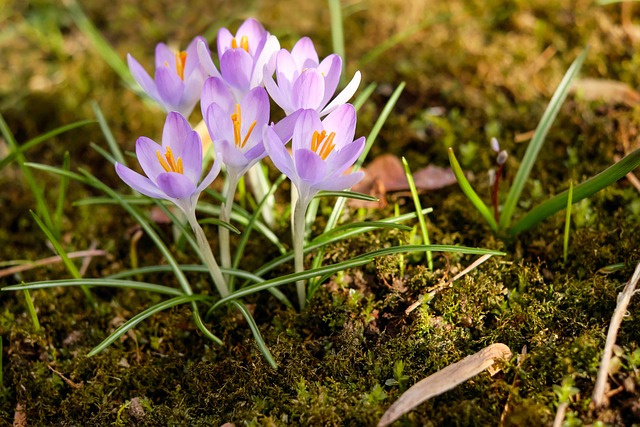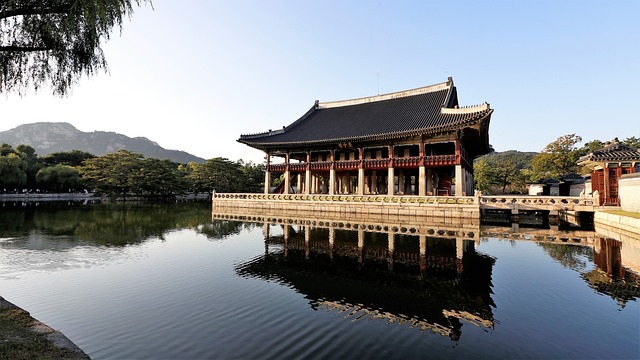Welcome to the charming land of South Korea, where the allure of the past and the stunning beauty of nature intertwine to create a captivating tapestry of timelessness. In a world that seems to be constantly evolving, South Korea stands proud as a guardian of history and an oasis of natural wonders. Delve into a realm where ancient palaces whisper tales of long-lost dynasties, while pristine landscapes paint a picture of serene tranquility. Join us on a journey across this captivating land, as we unveil the best historical and natural destinations that will leave you breathless and wanting more. Embark on an adventure that seamlessly blends the past with the present, and discover the extraordinary stories and breathtaking landscapes that make South Korea an enchanting gem in Asia.
Table of Contents
- Timeless Beauty: Best Historical and Natural Destinations in South Korea
- 1. Exploring South Korea’s Rich Cultural Heritage: A Journey Back in Time
- 2. Gyeongbokgung Palace: Unveiling the Majestic Heart of Seoul
- 3. Jeonju Hanok Village: Immerse Yourself in Traditional Korean Beauty
- 4. Serene Serendipity: Discovering the Tranquil Beauty of Jeju Island
- 5. Temples and Mountains: Embarking on a Spiritual Retreat in Seoraksan National Park
- 6. Hahoe Folk Village: A Living Museum of Ancient Korean Customs
- 7. The Historic City of Gyeongju: An Open-Air Museum of Silla Dynasty Treasures
- 8. Jirisan National Park: Unleash Your Inner Explorer amidst Nature’s Splendor
- 9. Bukchon Hanok Village: Strolling Through the Charming Alleyways of Old Seoul
- 10. Hwaseong Fortress: A UNESCO Heritage Site Guarding Suwon’s Secrets from the Past
- 11. Healing Waters: Unwinding at the Sulphur Hot Springs of Jjimjilbang
- Q&A
- In Conclusion

Timeless Beauty: Best Historical and Natural Destinations in South Korea
South Korea is a treasure trove of historical and natural wonders that will transport you to another time and leave you in awe of its breathtaking beauty. Whether you are a history enthusiast, a nature lover, or simply seeking a unique and unforgettable experience, this vibrant country has something to offer for everyone. From ancient palaces steeped in rich culture to serene natural landscapes that will leave you speechless, here are some of the best historical and natural destinations that should be on your bucket list.
Step into the Past at Gyeongbokgung Palace
Immerse yourself in the grandeur of South Korea’s history by visiting Gyeongbokgung Palace in Seoul. This magnificent palace, also known as the “Palace of Shining Happiness,” was built in 1395 and served as the main royal palace during the Joseon dynasty. As you wander through its opulent halls and serene gardens, you will truly feel like you have traveled back in time. Marvel at the intricate architecture, the colorful pavilions, and the sheer size of this architectural marvel. Don’t miss the majestic changing of the guard ceremony that takes place multiple times a day, adding a touch of authenticity to your visit.
Be Captivated by the Otherworldly Beauty of Jeju Island
Escape the bustling city life and venture to the enchanting Jeju Island, a natural wonderland that will take your breath away. Known as the “Island of the Gods,” Jeju is home to remarkable volcanic landscapes, pristine beaches, and lush forests. Hike up the awe-inspiring Seongsan Ilchulbong peak, where you can witness the stunning sunrise and take in panoramic views of the island. Explore the mystical Manjanggul Cave, one of the longest lava tunnels in the world, and get lost in its ethereal underground formations.
Discover the beauty of Hallasan National Park, a UNESCO Biosphere Reserve, boasting the majestic Hallasan Mountain at its heart. Embark on a scenic trek to the summit and be rewarded with breathtaking vistas of the surrounding landscapes. Be sure to rejuvenate your soul in one of the island’s famous soft volcanic rock baths, a truly unique and soothing experience.
1. Exploring South Korea’s Rich Cultural Heritage: A Journey Back in Time
Immerse yourself in the timeless beauty of South Korea as we take you on a journey back in time. From historical landmarks that have stood the test of time to breathtaking natural wonders, this post will guide you through the best destinations to explore in this culturally rich country.
Step into History
South Korea is a treasure trove of historical sites that offer a glimpse into its fascinating past. Start with a visit to Gyeongbokgung Palace, the iconic symbol of Seoul. Marvel at the intricate architecture and witness the changing of the guard ceremony. Next, head to the ancient city of Gyeongju and explore the UNESCO World Heritage Sites, including the awe-inspiring Bulguksa Temple and the majestic Seokguram Grotto. Take a stroll through Bukchon Hanok Village, where you can experience the traditional Korean way of life in beautifully preserved hanok houses.
Natural Wonders
South Korea is not just about its historical heritage; it is also blessed with awe-inspiring natural landscapes. Venture to the breathtaking Jeju Island, known for its stunning beaches, volcanic craters, and majestic waterfalls. Hike up Seoraksan National Park and be rewarded with panoramic views of lush valleys and towering peaks. Explore the serene beauty of Boseong’s green tea fields and take a leisurely boat ride along the picturesque Geumgang River. South Korea’s natural wonders will leave you in awe and provide the perfect escape from the hustle and bustle of city life.
Cultural Gems
Delve deeper into South Korea’s cultural heritage by experiencing its traditional customs and lively festivals. Participate in a hanbok (traditional Korean clothing) wearing session and embrace the elegant beauty of the attire. Witness the dazzling lantern festivals that illuminate the night sky, such as the Jinju Lantern Festival and the Andong Mask Dance Festival. Savor the flavors of Korean cuisine, famous for its diverse dishes like kimchi, bibimbap, and bulgogi. Understanding the vibrant traditions and way of life will truly enrich your journey in South Korea.

2. Gyeongbokgung Palace: Unveiling the Majestic Heart of Seoul
Located in the heart of Seoul, the Gyeongbokgung Palace stands as a true testament to South Korea’s rich history and grandeur. This magnificent palace, also known as the ”Palace Greatly Blessed by Heaven,” is the largest and most iconic of the Five Grand Palaces built during the Joseon Dynasty. As you step through its ornate gates, prepare to be transported back in time to the glory days of the Korean royal court.
One of the highlights of visiting Gyeongbokgung Palace is witnessing the Changing of the Royal Guard ceremony. Marvel at the precision and grace of the guards as they perform this time-honored tradition, complete with vibrant costumes and elaborate rituals. Immerse yourself in the sights and sounds of the royal court as the guards march in unison, showcasing the impeccable military discipline that once protected the palace grounds.
Stroll through the palace’s expansive grounds and be captivated by its sprawling architecture. Take a leisurely walk around the picturesque Geunjeongjeon Hall, the main throne hall of the palace, which served as the center of power and governance in ancient Korea. Admire the intricate details of the hall’s colorful painted ceilings and grand ornamental decorations, truly a feast for the eyes. Don’t forget to explore the beautiful gardens and peaceful pavilions, where you can find solace amidst the hustle and bustle of modern Seoul.
3. Jeonju Hanok Village: Immerse Yourself in Traditional Korean Beauty
Nested between the picturesque mountains of Jeollabuk-do province, Jeonju Hanok Village offers a captivating glimpse into the rich cultural heritage of South Korea. This living museum, with its well-preserved traditional hanok houses and cobblestone streets, takes you back in time to experience the charm and grace of old-world Korea. Stroll through the village, breathe in the air heavy with history, and immerse yourself in the timeless beauty of this remarkable destination.
1. Aesthetic Elegance:
Every turn you take in Jeonju Hanok Village reveals a new facet of its aesthetic elegance. The elegant hanok houses, with their sloping roofs and intricate architectural details, showcase the impeccable craftsmanship of traditional Korean architecture. Take a moment to appreciate the vibrant hanji paper windows that cast a soft, ethereal light across the rooms. Bold colors and patterns adorn the doors and walls, each symbolizing a unique facet of Korean culture. Explore the charming boutiques, galleries, and tea houses tucked away within the narrow alleyways, offering a true feast for the eyes.
2. Cultural Heritage:
This village is not only a visual treat but a treasure trove of cultural experiences. Step into a hanbok, the traditional Korean attire, and embrace the grace and tradition it exudes. Marvel at the skillful hands of artisans crafting stunning traditional handicrafts, from delicate embroidery to intricate ceramic pottery. Dive into the gastronomic wonders of Jeonju by savoring bibimbap, the signature dish of the region, or exploring the vibrant night market where street food comes alive. Immerse yourself in traditional performances, such as the mesmerizing pansori singing or the captivating art of Namsadang, a traditional Korean circus.
3. Natural Beauty:
Surrounded by the serene beauty of nature, Jeonju Hanok Village stands as a harmonious blend between the man-made and the natural. As you meander through the village, take a moment to explore the lush greenery of the surrounding gardens and parks. Admire the towering trees that have stood witness to centuries of history, providing shade and tranquility to its visitors. To truly appreciate the natural beauty of the village, climb up the nearby Omokdae Pavilion and be rewarded with breathtaking panoramic views of the village and its scenic surroundings. The village seamlessly merges with nature, making it a haven for serenity seekers and nature lovers alike.
Uncover the hidden gems of South Korea and let Jeonju Hanok Village transport you to a bygone era of grace, beauty, and cultural heritage. This timeless destination promises an unforgettable journey that will leave a lasting impression on your heart and soul.
4. Serene Serendipity: Discovering the Tranquil Beauty of Jeju Island
Jeju Island, also known as the “Island of the Gods,” is a hidden gem nestled off the southern coast of South Korea. Blessed with breathtaking landscapes and a rich cultural heritage, this island paradise offers an unparalleled experience for all who venture here. From volcanic wonders to pristine beaches, Jeju Island captivates visitors with its tranquil beauty. Here are some must-visit destinations that will leave you awestruck:
1. Seongsan Ilchulbong – Sunrise Peak
A UNESCO World Heritage Site, Seongsan Ilchulbong is a volcanic crater formed over 5,000 years ago. This majestic peak provides a stunning vantage point to witness the sunrise, casting enchanting hues over the turquoise waters. The hike to the top is a moderate one, rewarding eager adventurers with extraordinary views of the surrounding coastline and lush countryside. Don’t forget your camera to capture the serene beauty of this natural wonder!
2. Hallasan National Park
For a mesmerizing journey through nature, head to Hallasan National Park, home to South Korea’s highest peak, Mount Hallasan. Hiking enthusiasts will be thrilled to explore the diverse trails that lead to the summit where sweeping vistas await. Surrounded by dense forest, crystal-clear streams, and vibrant flora, you’ll feel a sense of serenity enveloping you. Immerse yourself in the tranquility and encounter the rare species of plants and wildlife that call this park their home.
3. Manjanggul Cave
Prepare to be amazed by the extraordinary underground beauty of Manjanggul Cave, one of the world’s finest lava tunnels. Stroll along the well-lit path that winds its way through a captivating maze of rock formations, stalactites, and stalagmites. As you delve deeper into the cavernous realm, you’ll feel a sense of awe as you witness nature’s artistic prowess on display. Take your time to appreciate this marvel of geological heritage and unravel the secrets hidden within its ancient walls.
5. Temples and Mountains: Embarking on a Spiritual Retreat in Seoraksan National Park
Nestled within the majestic Seoraksan National Park, South Korea offers an unparalleled spiritual retreat for those seeking solace and enlightenment. Immerse yourself in the timeless beauty of this harmonious blend of historical temples and awe-inspiring mountain ranges. Embarking on this journey will take you on a transformative adventure, allowing you to connect with both nature and your inner self.
Prepare to be mesmerized by the ancient temples that dot the park, each one showcasing remarkable architectural prowess and rich cultural heritage. Wander through the hallowed halls of Sinheungsa Temple, a sanctuary of tranquility and worship nestled amidst lush greenery. Witness the serenity as monks go about their daily prayers and rituals, offering a glimpse into the spiritual life of South Korea.
As you traverse the rugged trails of Seoraksan National Park, be captivated by the majestic mountains that surround you. The breathtaking peaks of Ulsanbawi and Daecheongbong stand as testaments to nature’s grandeur and power. Take a moment to meditate atop one of these magnificent summits, immersing yourself in the panoramic views that stretch as far as the eye can see. Allow the fresh mountain air and serene surroundings to rejuvenate your mind, body, and soul.
6. Hahoe Folk Village: A Living Museum of Ancient Korean Customs
Hahoe Folk Village is an enchanting destination that allows visitors to step back in time and immerse themselves in the rich cultural heritage of ancient Korea. Nestled at the foot of the majestic Hwasan Mountain, this living museum is truly a feast for the senses. With its traditional houses, centuries-old rituals, and picturesque natural surroundings, Hahoe Folk Village offers an unparalleled glimpse into the customs and traditions of a bygone era.
As you wander through the village, you’ll be captivated by the elegant hanok houses that line the narrow streets. These traditional Korean dwellings showcase the exquisite craftsmanship of the past, with their intricately carved wooden beams and beautiful thatched roofs. Step inside and you’ll be transported to a different time, as you explore the meticulously preserved interiors, furnished with authentic old-world items. Take a moment to sit on the heated floor, known as ondol, and experience the warmth and comfort that has been a part of Korean life for centuries.
But it’s not just the architecture that makes Hahoe Folk Village truly special – it’s the vibrant cultural traditions that come to life here. Don’t miss the chance to witness an exhilarating performance of the Hahoe Mask Dance, a cherished art form that has been passed down through generations. The rhythm of the drums and the mesmerizing movements of the dancers will leave you spellbound. Engage in hands-on activities like traditional craft-making or try your hand at archery, and feel the thrill of participating in customs that have been practiced for centuries. Hahoe Folk Village is a unique cultural treasure that offers a timeless experience of ancient Korean customs, and is a must-visit destination for history enthusiasts and nature lovers alike.
7. The Historic City of Gyeongju: An Open-Air Museum of Silla Dynasty Treasures
Discover the enchanting city of Gyeongju, a living testament to the magnificent Silla Dynasty. Often referred to as an open-air museum, this historic gem is home to a treasure trove of relics and architectural wonders from ancient Korea. Embark on a journey through time as you explore the numerous UNESCO World Heritage Sites that have stood the test of time for over a millennium.
Immerse yourself in the rich history of the Silla Dynasty by visiting the Gyeongju National Museum, where a vast collection of artifacts awaits. Marvel at the exquisite craftsmanship of gilded crowns, delicate pottery, and intricately carved Buddha statues that showcase the artistic prowess of the Silla people. Stroll through the picturesque Tumuli Park, where an astonishing 23 royal tombs are nestled among lush greenery. As you wander, imagine the grandeur and power that once emanated from this ancient kingdom.
But Gyeongju isn’t just about its historical treasures. Nature enthusiasts will be captivated by the serene beauty of Bomun Lake and its surrounding countryside. Sail across the tranquil waters, taking in the breathtaking views of towering mountains reflected in the crystal-clear surface. Take a leisurely hike along scenic trails adorned with vibrant cherry blossoms in the springtime or fiery autumn foliage that paints the landscape in a kaleidoscope of colors.
- Admire the majestic Bulguksa Temple, a UNESCO World Heritage Site and one of Korea’s most revered Buddhist temples.
- Step back in time at the Cheomseongdae Observatory, the oldest existing astronomical observatory in East Asia.
- Indulge your taste buds in Gyeongju’s traditional cuisine, known for its unique flavors and use of locally sourced ingredients.
8. Jirisan National Park: Unleash Your Inner Explorer amidst Nature’s Splendor
Located in the southern region of South Korea, Jirisan National Park is a haven for nature enthusiasts and history buffs alike. Spread across three provinces, this expansive park offers a diverse range of landscapes and attractions that will leave you in awe of its timeless beauty. As you venture into the heart of Jirisan, prepare to unleash your inner explorer amidst nature’s splendor.
With its towering peaks, picturesque valleys, and crystalline waterfalls, Jirisan National Park promises an unforgettable adventure. Lace up your hiking boots and embark on one of the park’s numerous trails, each offering its unique charms. From the popular Nogodan Peak trail, where you’ll witness breathtaking panoramic views, to the serene beauty of Cheonwangbong Peak, the highest peak in mainland South Korea, there’s a trail for every level of adventurer.
But Jirisan is not just about its natural wonders. Immerse yourself in the rich history of the park by exploring the ancient temples hidden within its depths. Be sure to visit Baekdamsa Temple, a sacred Buddhist site that dates back over a thousand years. Discover its intricate architecture, tranquil gardens, and the devoted monks who call it home. As you soak in the spiritual ambiance, you’ll feel a deep sense of tranquility wash over you, transporting you to a bygone era.
- Marvel at the vibrant hues of autumn foliage, painting the park in a kaleidoscope of reds, oranges, and yellows.
- Discover the hidden wonders of Jirisan’s valleys, where crystal-clear streams flow peacefully amidst lush greenery.
- Keep an eye out for the diverse wildlife that calls Jirisan home, including endangered species such as the Asiatic black bear and the Siberian chipmunk.
9. Bukchon Hanok Village: Strolling Through the Charming Alleyways of Old Seoul
Amidst the bustling cityscape of modern Seoul lies a hidden gem that takes you back in time. Welcome to Bukchon Hanok Village, a picturesque neighborhood that embodies the timeless beauty of traditional Korean architecture and culture. As you step into this enchanting district, be prepared to embark on a journey of discovery through its narrow alleyways, lined with over 900 traditional hanok houses.
Walking through Bukchon Hanok Village feels like entering a living museum. Each hanok whispers tales of centuries past, as their wooden exteriors and tiled roofs enchant visitors with their classic elegance. The hanok houses are well-preserved, offering an authentic glimpse into the lifestyle of the past. Don’t forget to snap some photos of the intricate latticework, graceful curves, and vibrant doors that adorn these architectural marvels.
Embrace the allure of Bukchon by exploring the maze-like streets at your own pace. Traverse the undulating terrain, relishing in the peaceful atmosphere that contrasts with the fast-paced city. Uncover hidden tea houses, small art galleries, and cozy cafés that are tucked away in unexpected corners. Each turn reveals a captivating scene, whether it’s a serene courtyard with a blooming garden or a panoramic view of Seoul’s modern skyline framed by traditional rooftops.
10. Hwaseong Fortress: A UNESCO Heritage Site Guarding Suwon’s Secrets from the Past
Embark on a journey back in time as you explore Hwaseong Fortress, a magnificent UNESCO World Heritage Site standing tall in the heart of Suwon, South Korea. This historic fortress, built in the late 18th century, not only serves as a fascinating reminder of Korea’s past, but also offers breathtaking views and a glimpse into the city’s vibrant cultural heritage.
Step into a world of architectural brilliance as you wander through the colossal stone walls, fortified gates, and commanding watchtowers of Hwaseong Fortress. Marvel at the intricate intricacies of its construction, showcasing the ingenuity and craftsmanship of the Joseon Dynasty. As you stroll along the fortress’s well-preserved ramparts, you’ll be treated to panoramic vistas of the cityscape and the surrounding natural beauty.
Delve deeper into the fortress’s hidden secrets by visiting its numerous palace pavilions, temples, and military facilities. Encounter the awe-inspiring brilliance of Hwaseong Palace, where the Joseon kings once resided, and be transported to a time of regal opulence. Uncover the intriguing mysteries of Hwahongmun Gate, adorned with vibrant, ornate paintings that narrate ancient legends. For nature enthusiasts, Hwaseomun Gate offers an escape into scenic gardens and tranquil ponds.
11. Healing Waters: Unwinding at the Sulphur Hot Springs of Jjimjilbang
When it comes to unwinding and rejuvenating in South Korea, there’s no better place than the Sulphur Hot Springs of Jjimjilbang. Nestled amidst the breathtaking natural beauty of the country, these healing waters offer a truly immersive experience that will transport you to a state of bliss.
Stepping into a Jjimjilbang, you’ll be greeted by a serene atmosphere, with soothing music and soft lighting setting the mood for relaxation. The hot springs, known for their therapeutic properties, are the centerpiece of these Korean bathhouses. Immerse yourself in the warm waters as they work their magic on your body, soothing your muscles and relieving any stress or tension.
But the healing waters of Jjimjilbang don’t just provide physical benefits. They also offer a spiritual element that will leave you feeling refreshed and renewed. As you soak in the hot springs, take a moment to reflect and meditate, allowing the tranquil surroundings to envelop you. The Sulphur Hot Springs of Jjimjilbang truly provide a holistic experience that will leave you feeling both relaxed and rejuvenated.
Q&A
Q: Are there any historical sites in South Korea that are a must-visit for travelers?
A: Absolutely! South Korea boasts a treasure trove of historical gems waiting to be explored. From splendid palaces to ancient temples, you’ll be mesmerized by destinations like Gyeongbokgung Palace, Bulguksa Temple, and Changdeokgung Palace. Immerse yourself in the rich history and culture of South Korea!
Q: What are some natural wonders in South Korea that shouldn’t be missed?
A: Nature enthusiasts, rejoice! South Korea offers breathtaking natural landscapes that rival any other destination in the world. Don’t miss out on the stunning beauty of Seoraksan National Park, where you can hike amidst majestic mountains and gaze at jaw-dropping waterfalls. Another must-visit is Jeju Island, with its picturesque beaches, volcanic formations, and lush forests. Prepare to have your breath taken away!
Q: Can you suggest some off-the-beaten-path destinations for those looking for unique experiences?
A: Of course! For those seeking a unique adventure, head to the beautiful town of Andong. Here, you can witness traditional masked dances, visit tranquil Confucian academies, and even experience a homestay in a charming Hanok village. Another hidden gem is the folk village of Bukchon Hanok in Seoul, where you can stroll through quaint alleys lined with traditional houses, and possibly even participate in a Korean craft workshop. These off-the-beaten-path experiences are bound to leave a lasting impression!
Q: Is it possible to combine historical and natural exploration on one trip?
A: Absolutely! South Korea offers the perfect blend of historical and natural wonders, allowing you to have the best of both worlds. For example, you can visit the ancient UNESCO World Heritage Site, Hwaseong Fortress in Suwon, and then venture to nearby Nami Island for a peaceful walk amidst beautiful tree-lined paths. Pair a visit to the historic city of Gyeongju, known as the “Museum Without Walls,” with a trip to the awe-inspiring Bulguksa Temple. There’s no shortage of opportunities to immerse yourself in both history and nature!
Q: What makes South Korea’s historical and natural destinations so unique?
A: South Korea’s historical and natural destinations not only showcase the country’s profound heritage and astounding beauty, but they also offer a unique opportunity for visitors to engage with the local culture and traditions. Whether it’s a chance to witness colorful traditional ceremonies or hike along breathtaking trails, you’ll find yourself immersed in a world that seamlessly harmonizes the past and the present. South Korea’s commitment to preserving its historical and natural wonders is truly commendable, making each visit an unforgettable experience.
Q: Any tips for travelers planning to visit these destinations?
A: Absolutely! First and foremost, remember to pack comfortable shoes as you’ll be doing a fair amount of walking and exploring. Be sure to check the weather conditions for your travel dates and dress accordingly. Additionally, try to learn a few basic phrases in Korean—it’ll go a long way in connecting with the locals and enhancing your experience. Lastly, don’t forget to bring a good camera to capture the beauty of South Korea’s historical sites and natural landscapes. Prepare to be enchanted and enjoy every moment!
In Retrospect
As we bid farewell to the enchanting landscapes and captivating stories of South Korea’s historical and natural wonders, we can’t help but feel a tinge of nostalgia. It is a reminder that beauty, in all its timeless glory, exists not only in the present but echoes through the corridors of the past.
From the mesmerizing grandeur of Gyeongbokgung Palace to the tranquil serenity of Seoraksan National Park, South Korea has unfolded its secrets, revealing the delicate balance between man-made marvels and nature’s own meticulous artistry. Each destination we explored has gifted our senses with a symphony of colors, melodies, and scents, transcending time and captivating our souls.
As we traced our fingers along the intricately painted walls of ancient temples, we felt the pulse of countless generations who found solace and inspiration within those very stones. We stood in awe underneath the towering branches of ancient trees, whispering tales of resilience and growth that have withstood the test of time.
South Korea’s historical sites and natural landscapes have not only provided a feast for our eyes but nourished our minds and hearts with their wisdom. They have reminded us that in the face of constant change, there are eternal truths waiting to be discovered. They have shown us that beauty exists not only in the fleeting moments, but in the stories etched into the fabric of a nation’s identity.
As we take our final steps in this journey through the timeless beauty of South Korea, we are left with a new appreciation for the fusion of history and nature. Their intricate dance has created a symphony of enchantment, inviting us to become part of this magical narrative.
So let us carry the echoes of history and the whispers of nature as we venture into our own lives, forever inspired by the wonders we have witnessed. And as we bid adieu to the land of timeless beauty, we leave with a promise in our hearts to cherish and protect the treasures that South Korea, and the world at large, so graciously bestows upon us.
Until we meet again, may the spirit of South Korea’s historical and natural destinations forever guide our own paths towards beauty, knowledge, and appreciation. Farewell, but never goodbye!






